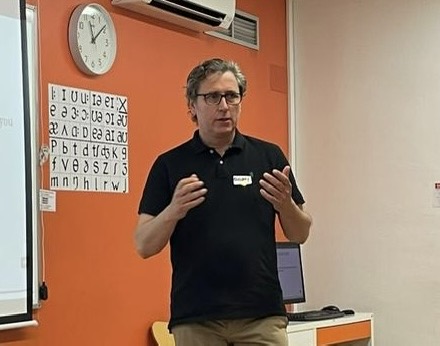Learner styles, personality types and multiple intelligence theory
- Barnaby Griffiths

- Apr 2, 2024
- 3 min read
How do you take different learner styles, personality types and multiple intelligence theory into account in your teaching? How do they affect your lesson planning and approach in the classroom?
In the modern age of language instruction, with the focus placed so firmly on the learner, and rightly so, I might add, learner styles, personality types and multiple intelligence theory have become a paramount consideration for language teachers and coaches alike.
As a longstanding TEFL Diploma tutor, I have had a lot of experience with this issue and the questions arising from it - not least because they are required components in the Teaching Practice part of the Diploma course - and I’ve found that even experienced teachers often struggle to address these factors in their planning and teaching. Indeed, I’ve witnessed hardworking, conscientious teachers compile page upon page of detailed learner notes in their lesson plans in an attempt to cover every possible angle of how their learners learn. Although this hard work was doubtless very useful for their professional development, little of it had much real effect on their teaching, given that the task of catering to the styles, personality types and intelligences of numerous learners in one class is a complex and potentially endless one.

That being said, the basic obvious answer to the question is of course variety, as in planning and executing a variety of task types to address these factors within your class. This would mean reducing the cognitive load so often prevalent in any learning situation and including tasks that not only address other skills (e.g. singing, handicrafts) / talents (e.g. acting / impersonations) / intelligences (bodily kinaesthetic - anyone want to dance?; emotional – anyone want to share some deeper feelings?), however uncomfortable it may make the learners or instructor feel (this is a common reason for teachers not to include certain tasks, much to the detriment of those learners who excel at them).
Although vital in a group context, such variety is not the only answer, however. Not to mention that it is far from the most efficient way of planning a class or session, even in these times of AI, where we can ask a machine to do this for us.
In my approach to language and communication coaching, I use meaningful rehearsal and reading aloud in front of others and/or on camera to make the vital connection between the mind and the body – in my experience, one of the biggest mistakes language teachers and learners both make is to assume that the link between understanding input and accurate and fluent reproduction of language is a natural one.
In case you were thinking I had digressed from the topic of this blog, however, now is the time to mention that the best thing about meaningful rehearsal and reading aloud in front of others and/or on camera is that it helps both the instructor and learner identify which areas of language retention and production the learner is stronger or weaker in, and this will directly reflect their learner style, personality type and intelligence profile. The language and communication coaching advice and direction we can then give our learner will be directly focused on their specific needs, while in a group context the whole process of rehearsing and reading aloud can be fruitfully exploited by allocating other learners different roles to help with preparation / direction / execution / feedback on the performance.

Another important feature of this work is that it directly mimics what learners will have to do with the language, steering their focus away from academic skills and performance, which is a red herring when it comes to speaking a language accurately and fluently - some of the better communicators I know found academic work very hard-going – and places it firmly on the complex skill of communicating competently in the language.
For more information on this, my teacher training and language and communication coaching courses, see previous blogs on this website, write to me directly at barnaby@bglc.es or visit https://barnaby-griffiths.teachable.com/?preview=logged_out.
It’s hard work being a teacher or a coach… so remember, we need to learn to work smarter, not harder!

Comments